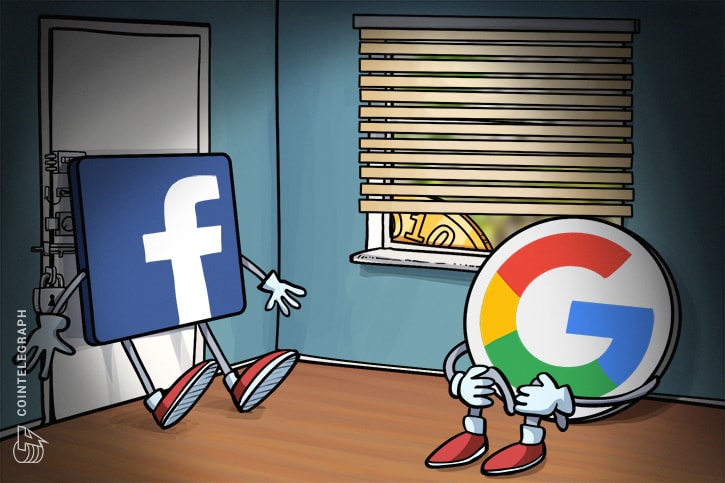Google announced Wednesday, March 14 that it will be forbidding advertisers from serving cryptocurrency-related ads via its ad network AdWords starting from June 2018, following a similar move made by Facebook back in January 2018.
The goal behind the ban, according to Google’s director of sustainable ads Scott Spencer, is to protect the search giant’s audience from “deceptive content” served by unscrupulous actors that use cryptocurrency, as well as other types of offers to scam people online. Spencer writes:
“As consumer trends evolve, as our methods to protect the open web get better, so do online scams. Improving the ads experience across the web, whether that's removing harmful ads or intrusive ads, will continue to be a top priority for us.”
Positive turns of phrase in Spencer’s text, such as “protect the open web” and “improving the ads experience”, may sound promising on the surface. But just a slightly closer look at Google’s new ad policy exposes what appears to be a contradiction of everything that the company stands – or at least once stood – for.
No crypto allowed
In what can only be described as a surprising lack of regard for nuance, Google listed “initial coin offerings” and “cryptocurrency trading advice” in the same breath as “binary options” and “synonymous products”, as it described the types of content that will no longer be allowed to be advertised via AdWords from June onwards.
Some may argue that banning ICO ads is justified – after all, since the explosion of popularity of this cryptocurrency-based fundraising model in 2017, it had become an easy and fairly popular tool for scammers to extract money from unsuspecting investors.
However, Google also plans to ban “cryptocurrency exchanges” and “cryptocurrency wallets,” the two types of businesses that have existed almost since the very inception of Bitcoin back in 2009, and the vast majority of which are providing real value to their customers and driving forward the growth of cryptocurrency as an industry.
Without explicitly stating it, the newly introduced ad policy additionally implies banning so-called Blockchain platforms, or companies that in some way integrate Blockchain technology — cryptocurrencies are almost always an integral part of Blockchain platforms’ ecosystems, contrary to what some mainstream opinion leaders would have you believe.
These would, for example, include Microsoft’s Ethereum Blockchain as a Service that it offers on its Azure platform, or IBM’s Hyperledger Fabric which, among other things, allows users to transact digital assets, a.k.a. cryptocurrencies.
Ironically, several companies that Google itself has invested in would have trouble advertising under the new policies as well, such as Storj, made possible by the company’s native SJCX cryptocurrency, or Veem, which uses none other than Bitcoin as a vehicle for its remittances.
Blockchain.info, one of the top Bitcoin wallets, which Alphabet Inc. invested in via its GV (formerly Google Ventures) arm, is now guaranteed to be restricted from AdWords due to the ban on ads of “cryptocurrency wallets” – that is, assuming Google is not going to violate its own policy.
From innovator to censor
And perhaps violate it will. What’s stopping a company that uses nigh-Orwellian doublespeak to describe AdWords as “an advertising ecosystem that works for everyone” just as it bans legitimate businesses from using it, and claims that it protects “the open web” by instituting what can easily be argued is targeted censorship?
With such a wide range of potentially affected businesses, this blanket ban on “all things crypto” is more reminiscent of an authoritarian, luddite government choosing to outlaw a technology that it does not understand, nor care to figure out, rather than of a company that has allowed innovative thinking turn it from a garage startup into a tech giant running the most popular search engine on the planet in well under 10 years.
One of Google’s most famous management practices is its “20 percent rule”: at least in the past, the company allowed its employees to spend 20 percent of their actual work time on side projects without supervision or strict guidelines. This license to create with no censorship in the form of corporate oversight has reportedly resulted in a lot of innovations for Google News, Gmail and AdSense, some of the principal services of Google.
Just a week ago, however, the company was busy denying their – in hindsight obvious – now public ad policy change in regards to cryptocurrency businesses and even pointing fingers at Facebook for doing the same, according to an email Finance Magnates received from Google. And this isn’t even the most absurd case of Google’s censorship attempts, as earlier in February it banned water guns and Burgundy wine from its shopping platform while trying to prevent illegal firearm sales.
What has happened is anyone’s guess. Perhaps, Google has grown complacent after positioning itself at the top of the food chain and decided that it doesn’t need to uphold its own ideals anymore. Or maybe they just don’t think the crypto and Blockchain industry is important enough to spend time separating the wheat from the chaff.
What’s more important to the people who understand that not everything with the word “cryptocurrency” in it is a scam is the realization that censorship resulting from unrestricted authority is exactly what Blockchain has been designed to disrupt. And it is not unlikely that Google itself will too realize this dark irony someday.
At press time, Cointelegraph is waiting for commentary from cryptocurrency industry experts who are likely to be affected by Google’s new policies. This article will be updated as soon as we receive their statements.


